- Home
- Linwood Barclay
The Twenty-Three 3 (Promise Falls) Page 4
The Twenty-Three 3 (Promise Falls) Read online
Page 4
“I . . . the other day, I felt—I was a little, you know, short of breath. At the drive-in. Climbing over stuff.” Also, recently, at Burger King, but I did not see the point in mentioning that particular incident.
“Okay,” Maureen said slowly.
“And she said that maybe I might want to start thinking about maybe considering some slight changes to, you know, my lifestyle, as such.”
“As such,” Maureen repeated.
“Yeah.” I shrugged. “So, that’s what I’m doing.”
Maureen nodded slowly. “Okay. Terrific.” She surveyed me, head to toe. “But you’re not going out like that.”
“Like what?”
“Those pants. Dear God, you look like you were shot and left to die in a vat of grapes.”
I looked down. “They are a bit purple.”
“There must be something else. Let me look.” She brushed past me and went into the closet. I could hear her moving clothes back and forth on the racks. “What about—no, not that. Maybe—”
My cell phone rang. It was plugged in next to the bed, still charging. I went over, saw who was calling, detached the cord, and put the phone to my ear.
“Duckworth.”
“Carlson.”
Angus Carlson. Our new detective, bumped up from uniform because we were shorthanded. As I recalled, he was working today.
“Yeah,” I said.
Maureen stepped out of the closet, a pair of gray sweats in her hand. How could I have missed those?
“You need to come in,” Carlson said. “Everybody and his dog is getting dragged in here.”
“What’s going on?” I asked.
“The end of the world,” Carlson said. “More or less.”
FOUR
WHENEVER David Harwood dismissed something his father heard, he regretted it later. If Don heard an odd rattle under the hood of David’s car, he got it checked out. That time, years ago, when David was just a kid, and Don heard something in the ceiling no one else had noticed, it turned out they had raccoons in the attic.
So when Don said he’d been hearing a lot of sirens, David walked out of the kitchen, through the living room, and out onto the front step of the house.
There was, in the distance, not just a siren but a chorus of sirens. At least two, maybe three. Maybe even more than three.
He scanned above the trees, looking for smoke, but they soared too high in his older part of town for him to see very far. But something was up. Even though David no longer worked for a newspaper, he still had a reporter’s instincts. He had to know what was going on.
He ran back into the house, grabbed his car keys from the hall table. Arlene spotted him, asked, “Where you off to?”
“Out,” he said.
Before he dropped into the seat of his Mazda, he stood and listened, trying to pinpoint just where the sirens were coming from. One sounded as though it was off to the east, but another seemed to be coming from the west.
Did that make any sense? If there’d been a major accident, wouldn’t all the sirens be coming from one place? Had two or more accidents happened almost simultaneously in different parts of the town? But then again, ambulances could be on their way to a single scene, approaching from disparate locations.
Didn’t matter, he decided. If what he was hearing was, in fact, ambulances, they’d all be headed to the same place: Promise Falls General.
That’s where he would go.
He did a quick glance up and down the street before he started backing the car out of the driveway. He had the rear wheels on the street when he heard a blaring horn. A blue van, coming out of nowhere, swerved, tires squealing, and went screaming past at, David guessed, nearly seventy miles per hour on a residential street where the limit was thirty.
The van was headed the same way David was going. It made a fast left turn at the next intersection, nearly going around on two wheels.
David tromped on the accelerator. As he was coming out of the neighborhood, the hospital a couple of miles ahead of him, he saw smoke. Rounding another corner, he saw three fire engines and flashing lights at the Exxon station, which was ablaze, the charred remains of a car visible straddling the island where the pumps stood. It looked to David as though the car had plowed straight into one of them. Was this what all the fuss was about? An explosion at the gas station?
He heard a siren approaching from behind him. He glanced in the mirror, saw an ambulance bearing down on him. He swerved over to the curb, screeched to a halt, figuring the emergency vehicle would be stopping a safe distance from the gas station.
But it raced right past the fire.
David took chase.
As the hospital came looming into view, he saw, crammed outside the emergency entrance, at least a dozen ambulances and enough flashing lights to give someone with photosensitive epilepsy a seizure. David ditched the car along a No Parking stretch on a street that bordered the hospital, and ran.
Back in the day, he’d have had a notebook in one hand and very likely a camera in the other. In a strange way, he felt naked. But even without those tools of his trade, he still had his observational skills, and one thing immediately struck him.
It was generally accepted procedure for paramedics to bring a patient into the ER, confer with admitting staff, make sure the person they’d brought in was being looked after, before departing.
That wasn’t what David was seeing.
Two paramedics from the ambulance that had passed him moments earlier were pulling out a woman on a stretcher, taking a few seconds to tell a doctor standing at the back of the vehicle what was wrong with her, then jumping back into the ambulance and taking off, tires squealing, siren engaged.
David ran past the cluster of ambulances into the emergency ward.
Bedlam.
All seats were taken, half with people waiting to be seen, the others occupied by desperately worried family members. There were moans, people crying, others shouting for help.
A man in his sixties struggled to stand and vomited on the floor in front of him. Several seats to the left of him, a woman in her thirties who’d been breathing rapidly suddenly stopped. A man with his arm around her screamed, “Help! Help!”
In addition to paramedics and hospital staff, there were uniformed police pitching in, but David could see a kind of helplessness in their eyes, as though they were overwhelmed and didn’t know what to do.
He spotted a woman with a child no more than six who was doubled over in pain. “What’s happened?” he asked.
The woman’s eyes brightened briefly with hope. “Are you a doctor?”
“No.”
“We need the doctor. When are we going to see the doctor? How long do we have to wait? My girl is sick. Look at her!”
“What’s wrong with her?” David asked.
The woman shook her head frantically, ran her words together hurriedly. “I don’t know. Kathy seemed fine, and then all of a sudden she just started feeling faint and she started breathing really fast and getting dizzy and—”
“Mommy,” Kathy whimpered, “I think I’m going to be . . . The room is all weird.”
“How fast?” David asked.
“It was, like, out of nowhere. She’s a perfectly healthy child! I’ve made sure she’s had all her shots and—” She stopped herself, as if she’d just thought of something. She reached into her purse and came out with her phone. “Why can’t I get service in here? My husband is in New York on business and I can’ t—”
“Which part of town do you live in?” David asked.
“What?” she said.
“Where do you live?”
“On Clinton,” she said. “Near the school.”
David definitely knew where that was. His girlfriend, Samantha Worthington, sent her son, Carl, to that school.
“I hope the doctor comes soon,” he said, and moved down a few seats to where a man was sitting, leaning over, elbows on knees.
“Sir?” he said.
&nbs
p; The man looked up. His eyes were glassy and lacked focus.
“What?”
“What’s your name?” David asked, thinking he recognized the man.
“Fisher,” he said, struggling to swallow. “Walden Fisher.”
David hadn’t worked on the Olivia Fisher murder case but followed it closely online while he was working at the Boston Globe. There’d been several pictures of the dead woman’s parents, and he believed this man was Olivia’s father. Not that he was going to bring up the fact.
“You need to give me something,” Fisher said. “I think . . . I think maybe I’m gonna pass out.”
“I’m sorry. I’m not a doctor.”
“. . . throat’s raw . . . throwing up . . . heart going a hundred miles an hour.”
“When did this happen?”
“. . . morning . . . breakfast. I felt okay. Had some coffee . . . started feeling funny. Stomach feels like it’s doing backflips.” He gave David a desperate look. “Why aren’t you a doctor?”
“I’m just . . . not,” he said. David asked him the same thing he’d asked the mother of Kathy. “Where do you live?”
Fisher mumbled an address, which was nowhere near where Kathy and her mother lived.
“Do you know any of these people?” he asked, pointing to all the others waiting to be seen. Maybe, he thought, they’d all been to the same fast-food restaurant the night before. Some mass case of food poisoning.
Someone collapsed onto the floor. A woman wailed.
Fisher said, “Should I? Is it my birthday?”
David was no epidemiologist, but it wasn’t stopping him from trying to figure out how all these people from all corners of Promise Falls would come down with similar symptoms at exactly the same time. Something in the air, maybe?
Had some coffee . . . started feeling funny.
Bad coffee? How could everyone in town suddenly get bad coffee? David glanced back at the sick girl.
She was too young to drink coffee. But—
David went back to the little girl’s mother, who was trying again to get reception for her phone. “What did she have for breakfast this morning?”
The woman, who was busily scratching her hand, looked up, tears in her eyes. “What?”
“What did Kathy have?”
“Nothing. She never eats breakfast. I try to get her to eat something, but she won’t.”
“Nothing to drink?”
The woman’s eyes danced. “Orange juice.”
David hadn’t asked Fisher whether he’d had orange juice in addition to his coffee. Had the town’s grocery stores taken in a shipment of contaminated juice? Was it like that scandal years ago when someone tampered with some headache medicine? But even if that was the case, was it likely that everyone would start drinking it at the same time?
But David still asked, “What brand?”
“I don’t . . . remember. It was frozen.”
“Frozen?”
“Concentrate. I mixed it up this morning.”
Water. Water to mix up the orange juice. Water to make the coffee.
David spun around, looked for someone in authority. There were so many nurses and doctors attending to people it was difficult to tell who was running the show. Maybe no one was.
Agnes would have been.
David thought briefly of his aunt, Agnes Pickens, who used to be in charge of this hospital, right up until she took her own life a couple of weeks earlier by jumping off Promise Falls.
Agnes, sadly, had turned out to be a pretty bad person. But right now, David conceded, this place needed her.
Someone nudged David out of the way. A man in his late twenties, pale green operating scrubs top and bottom, stethoscope around his neck. And a surgical mask over his mouth to protect him from whatever everyone in here might have.
David suddenly felt very exposed. Why hadn’t it occurred to him that what everyone in this room had could be extremely contagious? God, maybe some airborne contagion had been dropped on the town that morning. Promise Falls was already on edge about a possible terrorist attack after the drive-in came crashing down earlier in the week. There’d been no real evidence so far to suggest terrorists had done it—Promise Falls, a terrorist target, really?—but only a few days later, this?
The man knelt down before Kathy and said, “I’m Dr. Blake. What’s your name?”
Kathy, who appeared to be fading, did not answer. Her mother said, “Kathy. Her name is Kathy. I’m her mother. What’s happening? What does everyone have?”
The doctor, at least for now, ignored the question. He was looking into Kathy’s eyes, then putting his stethoscope to her chest.
“Hypotension,” Dr. Blake said.
“Hypertension? High blood pressure? That’s ridiculous in a child her age that—”
“Hypo, not hyper. Low blood pressure.”
“Why?” David asked.
The doctor whirled his head around. “I don’t know,” he said.
“Could it be the water?” David asked. “Some sort of contaminant?”
The doctor hesitated a moment, thinking, his eyes taking in the room. “It’s the best explanation I’ve heard so far,” he said. “That might account for the rashes.”
“Rashes?”
“A lot of people are complaining of skin irritation.” He said to the mother, “Bring your girl this way.”
“How many?” David asked.
“How many what?” the doctor said. Turning his head away from the child and her mother, he said, “Sick or dead?”
David had meant sick, but whispered, “Dead.”
“More than I can count,” he said under his breath. “Dozens, more every minute.”
The woman scooped Kathy into her arms and followed the doctor to one of the curtained examining areas.
“Jesus,” David said, and dug into his pocket for his own phone. He wasn’t surprised to see that he had no bars.
He ran out of the emergency ward, where ambulances and private cars continued to arrive with a steady stream of patients. He dialed home.
“Yes?” his mother said.
“Don’t drink the water,” David told her.
“What are you talking about? I thought the bottled water was way better than the other—”
“No, from the tap! Don’t drink it! It may be poisonous!”
Arlene shouted, not to David, “Don’t drink that! It’s David! Don’t drink that!”
David said, “Tell me Dad hasn’t had any of it.”
“He just made a new pot of coffee to make a point, the old fool.”
“Don’t drink anything out of the tap. Don’t even brush your teeth with it. In fact, don’t even let it get on your skin. Tell Ethan! Start phoning everyone you know and tell them not to drink the water.”
“What is it? What’s in the water?”
“I don’t even know if I’m right,” he said, “but right now, it’s the one thing that makes sense.”
“Are you going—”
“Mom! Call people!”
He ended the call, stayed on his list of contacts, thumbed through them.
Marla Pickens. His cousin. Newly reunited with the baby she had not known she had.
Matthew.
David had a mental image of Marla making up formula for the child. He called the home number.
It rang several times. David was about to give up when someone picked up, then dropped the receiver.
“Hello?” he said.
More fumbling, then, “Where are you?” Marla said, her voice shaking. “I called ten minutes ago!”
“You called me?”
A half-second pause. “David?”
“Yeah. Marla, listen, I might be wrong about this, but I think there may be something wrong with the—”
“I think he’s dead!” she screamed.
Dear God, Matthew.
“Marla, I’ll hang up. You call 911 and—”
“I called ages ago! No one’s showed up! I can’t wake him u
p!”
Why couldn’t David’s uncle Gill just drive Matthew to the hospital? “Get your dad to drive Matthew to the hospital! Don’t wait for the—”
“It’s not Matthew! It’s Dad!”
Just then, as if on cue, David could hear a baby crying in the background. He felt an overwhelming sense of helplessness. Judging by what he’d just seen in the hospital, if Gill looked dead to Marla, he probably was. David didn’t know what he could do for Gill if he were there, but he could at least give Marla, who’d already been through so much this month, some support. And along the way, stay on the phone and tell anyone else he could think of that they should not—
Sam.
Samantha Worthington and Carl. He had to warn them. It was barely nine o’clock on a Saturday morning and chances were they weren’t yet up. He hadn’t talked to Sam in a couple of days, but had been intending to phone her today, see if she wanted to get together that evening. David had been thinking maybe he could even find a way to get her son to have a sleepover at his house with Ethan. He’d planned to push his mother into the role of babysitter, which would allow him to have an even better sleepover with Sam at her place.
That, however, was no longer the priority.
David said to Marla, “Keep calling 911. I’m on my way. And whatever you do, don’t drink the water. It’ s—”
He thought he’d heard a click. “Marla?”
She’d gotten off the line.
Fine. He had to call Sam. David brought up her number, tapped it. She had no landline, but her cell was usually close at hand.
The phone rang.
And rang.
By the fourth ring, David was starting to panic. Suppose she and her son had risen early? Suppose they’d both had water from the tap?
Six rings.
Seven.
He ended the call, opting for a text instead.
He typed: CALL ME!
Waited for a response, for those three little dots to indicate Sam was composing a reply.
Nothing.
He added: DONT DRINK TAP WATER
As David ran for his car, he saw an unmarked police car wheel into the hospital lot, brakes screeching as it came to a halt.
Detective Barry Duckworth behind the wheel.
FIVE

 Chase
Chase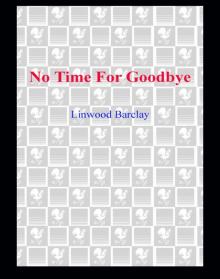 No Time for Goodbye
No Time for Goodbye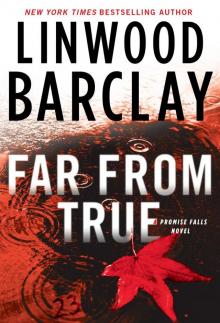 Far From True
Far From True Lone Wolf
Lone Wolf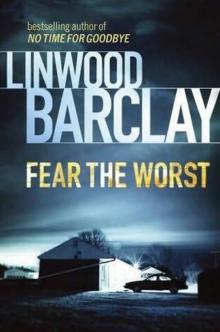 Fear the Worst
Fear the Worst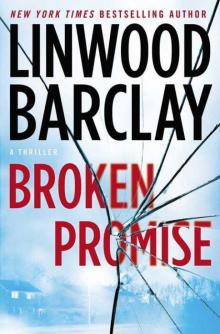 Broken Promise
Broken Promise A Tap on the Window
A Tap on the Window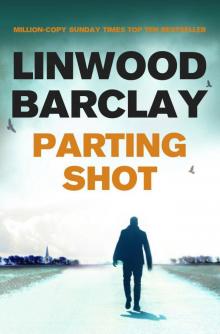 Parting Shot
Parting Shot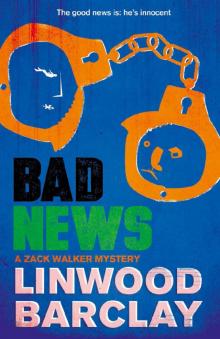 Bad News
Bad News Too Close to Home
Too Close to Home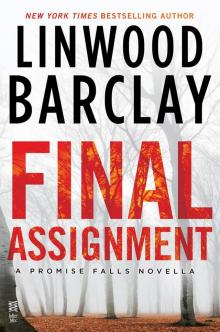 Final Assignment
Final Assignment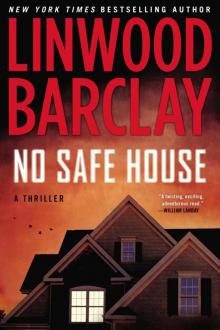 No Safe House
No Safe House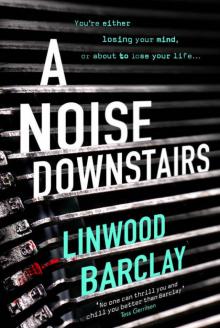 A Noise Downstairs
A Noise Downstairs Bad Guys
Bad Guys The Accident
The Accident Stone Rain
Stone Rain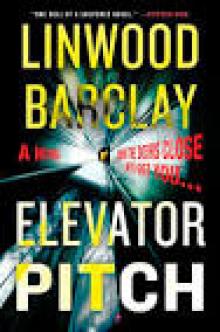 Elevator Pitch
Elevator Pitch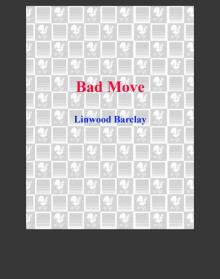 Bad Move
Bad Move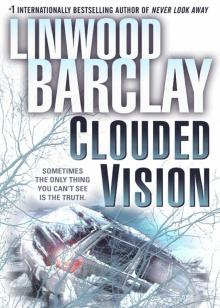 Clouded Vision
Clouded Vision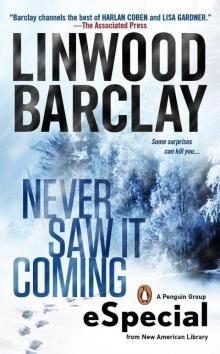 Never Saw It Coming
Never Saw It Coming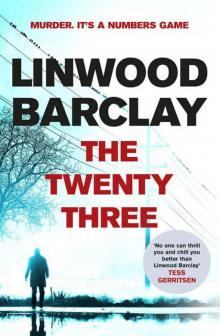 The Twenty-Three
The Twenty-Three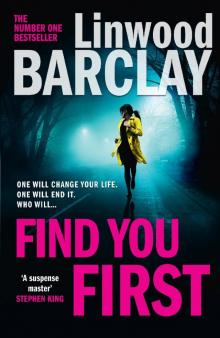 Find You First
Find You First Never Look Away
Never Look Away Elevator Pitch (UK)
Elevator Pitch (UK)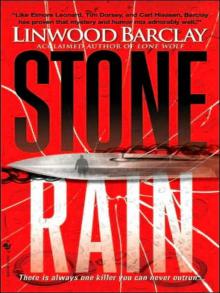 Stone Rain zw-4
Stone Rain zw-4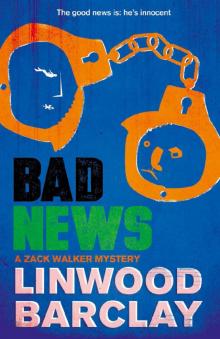 Bad News: A Zack Walker Mystery #4
Bad News: A Zack Walker Mystery #4 Lone Wolf zw-3
Lone Wolf zw-3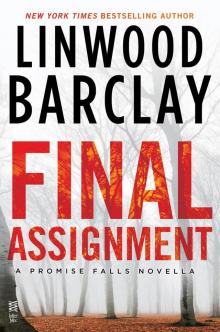 Final Assignment: A Promise Falls Novella
Final Assignment: A Promise Falls Novella Bad Guys zw-2
Bad Guys zw-2 Never Saw It Coming: (An eSpecial from New American Library)
Never Saw It Coming: (An eSpecial from New American Library) Never Look Away: A Thriller
Never Look Away: A Thriller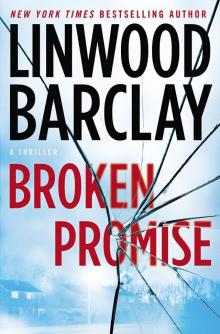 Broken Promise: A Thriller
Broken Promise: A Thriller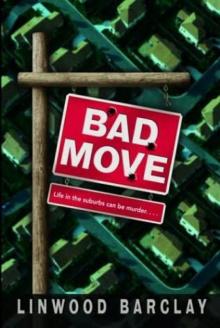 Bad Move zw-1
Bad Move zw-1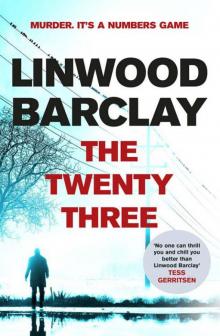 The Twenty-Three 3 (Promise Falls)
The Twenty-Three 3 (Promise Falls)